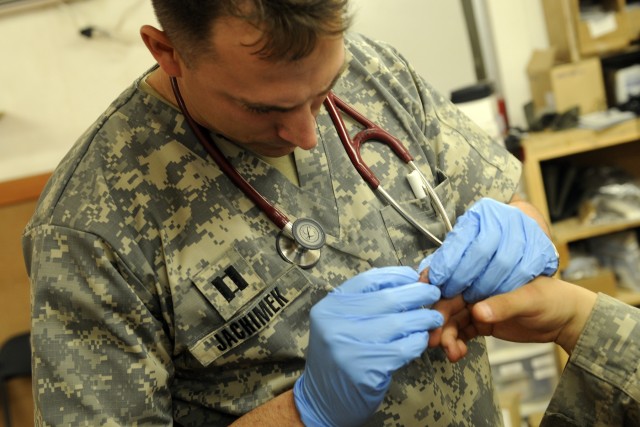
BAGHDAD - The walls are lined with boxes of packed supplies. The wooden floor in front of the reception desk is almost bare except for a solitary green stretcher and a few plastic chairs, sitting in a row. The building looks nearly deserted.
A Soldier in medical scrubs walks around the corner, talking to a patient whose arm is cradled in a blue sling. More medics walk into the room then disappear deeper into the building; some talking to patients, some packing supplies. Yet even as the Soldiers start moving faster, busy with tasks at hand, everyone looks happy, stopping to smile and chat with each other and the patients as they pass by.
The medics of Headquarters and Headquarters Battery, 1st Battalion, 41st Field Artillery Regiment, 1st Heavy Brigade Combat Team, 3rd Infantry Division, on Camp Stryker, have spent the last few months preparing for a move to a different base. As the move date nears, their plans are slowly transforming from ideas scribbled in notebooks to packed boxes and empty rooms, all while maintaining the top level of medical care possible for their Soldiers.
"We are just trying to maintain and do our jobs, making sure we are taking care of our Soldiers as well as preparing for this move," said Pvt. Jared Staie, a combat medic.
The medics agree the move is a bit of a hassle, but previous experience and constant planning has helped the process.
"From this deployment alone, we have moved from Georgia to the building we have currently, and then we [just moved] to a different building. And those types of experiences are helping this move go smoother," said Spc. Bjorn Carlson, also a combat medic and native of Minneapolis, Minn.
"The move is a difficult task, but everything else that would have gone on if we weren't moving is still continuing," said Spc. Michael Barbour, a combat medic and native of Road River, Oregon. "I've gone through so many notebooks, making sure we don't forget anything."
Although the team spends much time making sure the plans of the move are laid out, they cannot start packing until right before it is time to leave; they need all the supplies available for day-to-day operations.
But the most challenging part of the transition, said Spc. Derek Miller, combat medic, is the upgrade they will be going through simultaneously from a level one aid station to a level one plus. As they prepare for the upgrade, the team has to make sure they also have enough medics to man the aid station, operate sick call and be available to go out on missions if a unit requests them. This makes for some very long days for the team.
"We usually work 12- to 15-hour days," said Spc. Miller. "So that gets a little tiring. But we make sure to get out of the office and just go grab coffee or something to relax for a minute if we need to."
The medics still have time to find rewards within their job. Specialist Barbour said the welfare of the Soldiers they take care of is the greatest accomplishment for the team, and the other Soldiers agree.
Specialist Miller summed up their greatest reward right now.
"Make sure everyone is healthy and okay to be here," said Spc. Miller. "Everyone knows what we're doing - everyone's on top of their area - and that's pretty cool."

Social Sharing